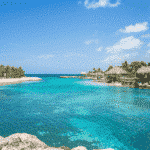Portugal tourism rewards travelers with the experience of a lifetime — whether you’re exploring its charming beaches, historic cities, or scenic landscapes. As one of the top travel destinations in Europe, Portugal offers an incredible blend of history, culture, and natural beauty that captivates every visitor. To make the most of your visit, we’ve curated this guide to help you plan your perfect journey through the country.
In this article, you will find out why Portugal is one of the best places to visit in the world.
You’ll also learn more about:
Why Visit Portugal?
There are plenty of things to do in Portugal that are captivating and promise a unique and enriching experience. Whether you’re exploring the scenic coastlines, uncovering historic landmarks, or wandering through vibrant regions, Portugal offers something unforgettable at every turn. Here are some reasons why Portugal is a must-visit destination:
- Weather: Portugal boasts a Mediterranean climate, providing pleasant weather throughout the year.
- Landscapes: The landscapes are tapestries that cater to all international tourists and varying preferences.
- People: Hospitality is deeply embedded in Portuguese culture, and the locals are renowned for their warmth and friendliness.
- Culture: Portugal is a country that knows how to celebrate and traditional festivals showcase the richness of Portuguese culture.
- Landmarks: Portugal boasts 17 UNESCO World Heritage Sites, including architectural marvels, historic cities, and cultural landmarks.
- Cuisine: From fresh seafood along the coast to iconic dishes like bacalhau (salted codfish), Portugal presents an unmatched gastronomic experience.
- Affordability: Portugal stands out as an affordable destination, providing excellent value for money compared to many other European countries.
Best Times to be a Tourist in Portugal

Below is a breakdown of favorable seasons and months to plan your Portugal adventure.
March to May (Spring): Spring in Portugal bursts with color as flowers bloom and temperatures remain mild. This season is perfect for nature enthusiasts, with lush greenery transforming the countryside. The pleasant weather is ideal for exploring cities, hiking trails, visiting the coast, and enjoying outdoor activities.
June to August (Summer): Summer is the peak tourist season in Portugal, drawing international tourists with its long, sunny days and lively atmosphere. Coastal regions, with stunning beaches along the Atlantic Ocean, are hotspots. Festivals and events offer a vibrant taste of local culture.
September to November (Autumn): Autumn brings a more relaxed ambiance, with slightly cooler temperatures and fewer tourists. The landscapes retain their beauty, and the vineyards are particularly picturesque as the grape harvest season begins. It is ideal for Portuguese wine tasting in renowned regions like the Douro Valley.
December to February (Winter): Winter in Portugal is rainy and cold but mild compared to many European destinations, making it an appealing option for visitors seeking a winter getaway. While Northern Portugal may experience cooler temperatures, the southern areas, including Lisbon and the Algarve, remain relatively mild.
10 Must-See Places in Portugal in 2025
Most of the best cities in Portugal offer a vibrant mix of culture, history, and modern attractions. Lisbon is the lively capital, Porto is renowned for its wine and colorful buildings, while the Algarve region features golden sands and dramatic cliffs. Here are 12 cities that every tourist should try to visit.
1. Porto
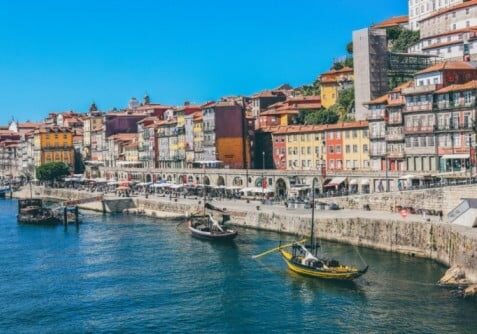
The city is known for its namesake wine, Port, and you can taste it straight from the source in the Vila Nova de Gaia cellars, just across the river. But beyond that, Porto has a strong character: part faded grandeur, part creative revival. Wander the narrow lanes of Ribeira, explore tiled train stations and baroque churches, or dive into the artsy vibes of Cedofeita and the newer food markets.
It’s a city that feels lived-in and local, where you’re just as likely to stumble upon a family-run tasca as you are a trendy café. The pace is unhurried, and the people are warm in a down-to-earth kind of way.
Add in river cruises, Atlantic beaches, and easy access to the Douro Valley, and Porto becomes more than just a city stop—it’s a place that sticks with you.
2. Lisbon
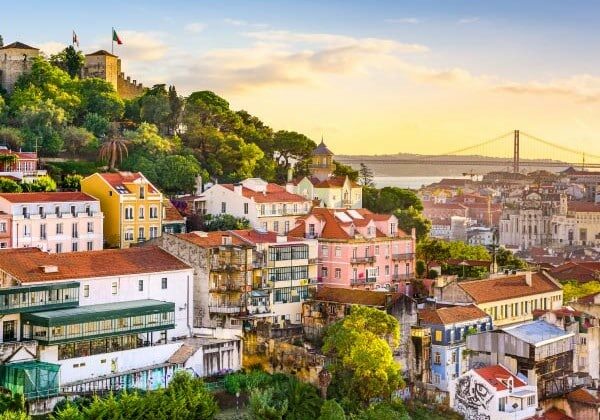
The city’s history runs deep, from Moorish castles to grand Age of Discovery landmarks like Belém Tower and Jerónimos Monastery. But Lisbon isn’t stuck in the past. There’s a strong creative pulse, with street art, design shops, and a rising food scene that blends old-school tascas with bold, contemporary dining.
It’s also surprisingly laid-back for a European capital. Locals linger over coffee at esplanadas, and golden-hour views from the city’s many miradouros (viewpoints) are a daily ritual.
You’re never far from the water, either—whether it’s riverside hangouts along the Tejo or surf-ready beaches just a short train ride away. Lisbon makes it easy to slow down, but still packs in enough culture, nightlife, and day trips to keep you exploring for days.
3. Funchal, Madeira
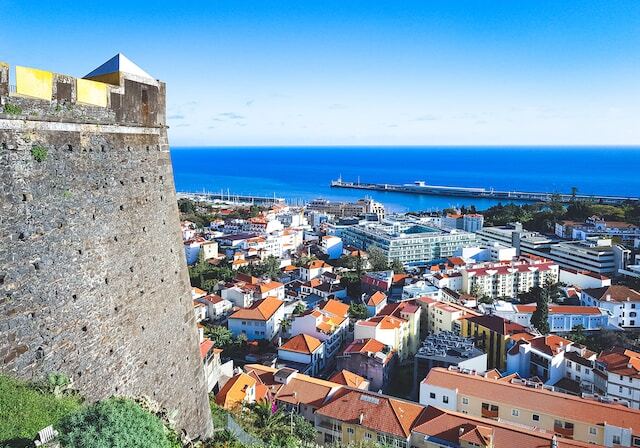
The old town, with its narrow lanes and painted doors, is full of charm—and cable cars glide up to Monte for sweeping views and a ride back down in the island’s famous wicker toboggans. Food and wine are central here too: think fresh seafood, espetadas (meat skewers), and tastings of Madeira wine straight from local producers.
Despite its resort reputation, Funchal still feels authentic. The waterfront is perfect for strolls, and the local market, Mercado dos Lavradores, offers a peek into daily island life.
It’s also a great base for exploring the rest of Madeira—whether you’re hiking levadas, swimming in natural volcanic pools, or heading out on a dolphin-spotting boat trip or to beautiful beaches. The vibe is mellow but never dull.
4. Lagos
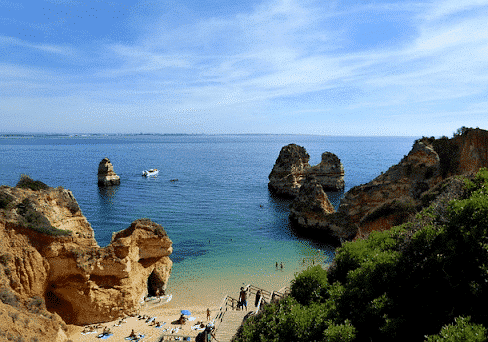
It’s best known for its dramatic cliffs and sea-carved grottos—especially around Ponta da Piedade, one of Portugal’s most photogenic coastal spots. The beaches are top-tier, with Praia Dona Ana and Meia Praia offering golden sand and clear waters.
In town, you’ll find a mix of lively bars, surf shops, street performers, and historic sites like the old city walls and 17th-century forts.
While tourism is big here, Lagos still holds onto its roots. There are cozy local restaurants tucked among the nightlife, and quieter corners if you want to skip the crowds.
It’s also a favorite for active travelers—surfing, kayaking, and boat tours are everywhere. Whether you’re into beach lounging or sea adventures, Lagos delivers without trying too hard. Getting around can be tricky though. You might want to consider one of the many rental cars available.
5. Albufeira

The old town still charms with whitewashed buildings, tiled plazas, and clifftop views. It’s also one of the most family-friendly spots in the Algarve, with theme parks, boat tours, and calm beaches like Praia dos Pescadores close to the center.
If you’re after convenience, Albufeira has it all—plenty of dining options, tour companies, and places to stay. It’s touristy, yes, but also easygoing and sun-soaked, with a coastline that’s hard to beat.
You can make it as laid-back or as lively as you want, which is part of its wide appeal.
6. Coimbra
Coimbra is Portugal’s historic university town, known for its hilltop campus, student traditions, medieval architecture and the stunning Joanina Library. It has a scholarly vibe, with winding lanes, river views, and a local version of fado that’s unique to the city. Compact and walkable, Coimbra blends old-world charm with a laid-back pace that’s perfect for a cultural stop between Lisbon and Porto. It has one of Portugal’s oldest universities, and while it is in the central region far away from the Atlantic coast, it attracts even domestic tourists.
7. Braga
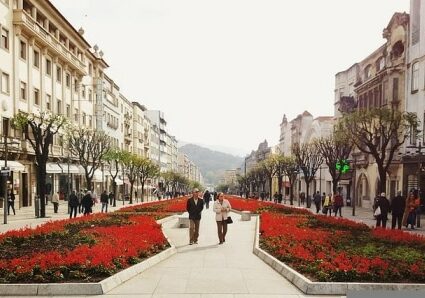
It’s famous for its baroque churches—especially Bom Jesus do Monte—and its walkable old town full of cafés, plazas, and historic facades. Less touristy than nearby Porto, Braga offers a nice mix of tradition and everyday life.
Situated in northern Portugal, Braga is the oldest city in the country Founded by the Romans, it’s a fascinating destination with over 2000 years of history. Sé Cathedral, Museu de Arte Sacra, and Museu dos Biscainhos are must-visits in Braga. As the fourth-largest city in Portugal, it’s popular among tourists and international students.
8. São Miguel Island, the Azores
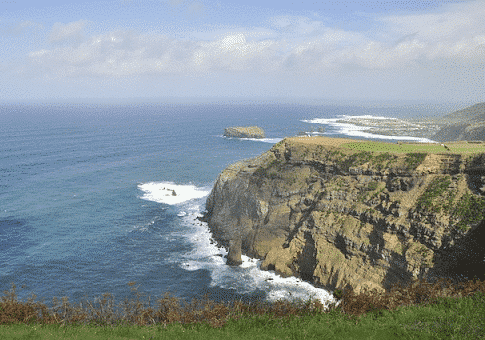
Travel around the island and discover small villages, hot springs, and other natural wonders. Key attractions include whale-watching trips, Lagoa das Sete Cidades, Gorreana Tea Factory, Caldeiras Vulcânicas, and Lagoa das Empadadas.
With its remarkable coast, golden beaches, and varied experiences, São Miguel offers a unique glimpse into Portugal’s beauty and is a standout spot in the region. It highlights the charm of Portuguese tourism in this part of Europe.
9. Sintra
Sintra is a fairytale town just outside Lisbon, known for its misty forests, pastel palaces, and romantic gardens. The main draws are Pena Palace, Quinta da Regaleira, and the Moorish Castle—but it’s also worth exploring the quieter trails and tea houses in the hills. Expect crowds, but the setting and the medieval architecture are truly unique.
10. Évora
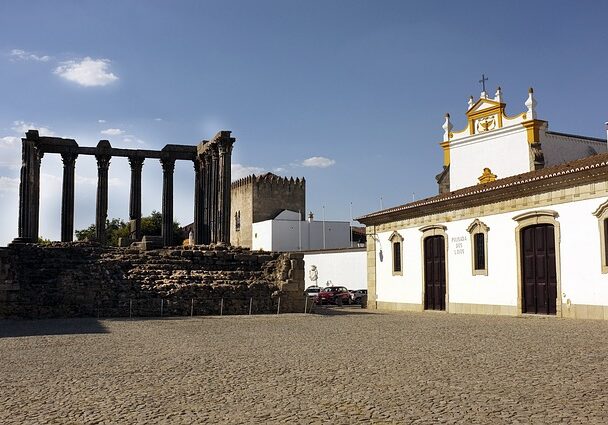
The city’s historic center is an open-air museum with labyrinthine streets leading to charming squares and the impressive Évora Cathedral. For visitors interested in Portugal’s past, Évora’s well-preserved architecture and vibrant cultural scene are a must-see.
As part of the broader region and tourism landscape, Évora provides a unique glimpse into the medieval history of Europe while showcasing local markets and traditional festivals.
Portugal's Tourism Visa Requirements
Visa requirements for visiting Portugal as foreign tourists vary depending on your country of origin. These requirements can change, so you should always check for the most up-to-date information.
Portugal is a member of the Schengen Area, and if you are from a non-Schengen country, you may need to obtain a Schengen visa for short stays (up to 90 days within a 180-day period). The Schengen visa allows you to travel to all Schengen countries, including Portugal.
Some countries’ citizens are exempt from the Schengen visa requirement and can enter Portugal for short stays without a visa. The list of visa-free countries includes many European countries, such as Brazil, the United States, Canada, Australia, and others.
Suppose you plan to stay in Portugal for longer than 90 days or for purposes such as work, study, or family reunification. In that case, you may need to apply for a national visa or residence permit before traveling. Specific requirements and application procedures vary based on your country of origin and the purpose of your stay.
Why choose Global Citizen Solutions for your Immigration Visa?
GLOBAL APPROACH BY LOCAL EXPERTS
- GCS has offices located across Portugal.
- Members of the US-Portugal and UK-Portugal Chambers of Commerce in Portugal, and the Investment Migration Council (IMC).
- Our expert team can help you throughout your journey to secure your Visa.
100% APPROVAL RATE
- Our successful track record in applications provides reassurance to applicants.
- We have helped clients from more than 35 countries secure residency in Portugal.
ALL-ENCOMPASSING SOLUTION
- With a single channel of communication, our approach ensures that you have complete clarity on your application.
- Our BeGlobal® Onboarding System allows for a total flow of information.
TRANSPARENCY AND PRIVACY
- Our pricing is clear and detailed, you will not face any hidden costs.
- All data is stored within a GDPR-compliant database on a secure SSL-encrypted server.
Frequently Asked Questions About Portugal's Tourism
Why is Portugal the best holiday destination in Europe?
Portugal is known for its history, beautiful beaches, and welcoming Portuguese residents. Lisbon and Porto offer rich culture and vibrant city life. The coast and inland regions attract many tourists. It’s a top destination for visitors from across Europe, and there are several Portugal Visa options.
What is the best month to visit Portugal?
The best time to visit Portugal is spring or fall. These months offer fewer tourists and pleasant weather for exploring Lisbon, Porto, and the coast. It’s also great for visiting tourist places, so you might want to consider rental cars but many cities have public transportation.
What are the best tourism places in Portugal?
Lisbon and Porto are must-see cities in Portugal. The Algarve beaches and Sintra’s palaces are also top spots. The coast is ideal for tourists seeking relaxation, while the Douro Valley and Azores offer beautiful landscapes. These diverse regions highlight Portugal as a premier destination.
Is Portugal expensive for international tourists?
Portugal is affordable compared to Italy and Spain. Visitors enjoy great value in Lisbon, Porto, and along the coast. The local currency is the Euro, and it stretches far in many regions. This makes Portugal a budget-friendly destination for tourists. Finding short-term rentals in Portugal are also relatively easy and affordable.
What is the most reliable mode of transport for tourists visiting Portugal?
Public transportation in Portugal, especially in Lisbon and Porto, is reliable. Buses and trains connect major cities and regions along the coast. For remote areas, renting a car is ideal. Tourists can easily explore the whole country this way.
Do Americans need Visas to explore Portuguese tourism?
According to the Portugal Visa Entry Requirements, American tourists do not need a visa for stays up to 90 days in Portugal. Exploring Lisbon, Porto, and other tourist places in Portugal is easy. Ensure your passport is valid for your trip. Portugal welcomes visitors from the U.S. without visa requirements.
Are Portuguese residents welcoming?
Yes, Portuguese residents are very welcoming to tourists. Whether in Lisbon or along the coast, they are friendly and helpful. Visitors often feel at ease when exploring the cities. This adds to Portugal’s appeal as a top destination, and one of the safest cities in Europe.
How does Portugal's tourism compare to that of coastal countries like Spain and Italy?
Portugal offers more affordability than Spain and Italy. Lisbon and Porto have fewer crowds than major cities in those countries. Its stunning coast and beaches attract many tourists. Portugal’s eco-friendly options, like eco tourism Portugal, are also rising in popularity.

 Gizane Campos
Gizane Campos 
